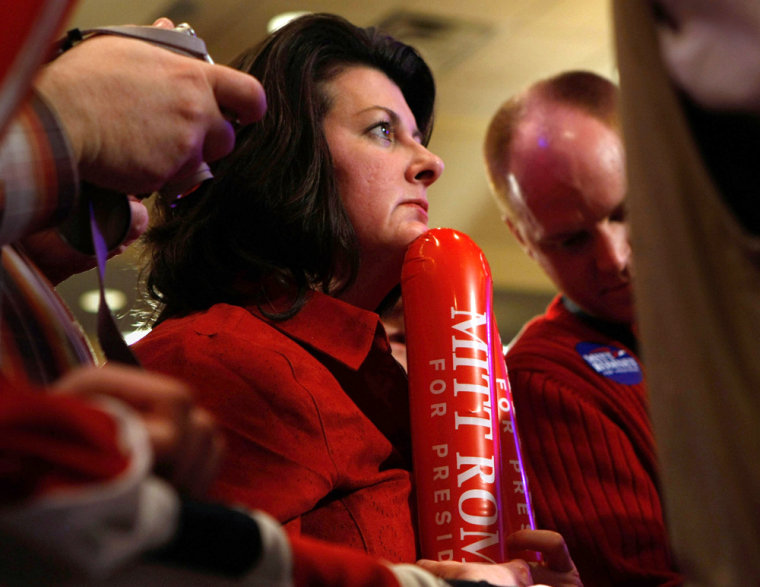Mitt Romney pledged a long fight for the Republican presidential nomination on Tuesday, despite finishing second to John McCain in the New Hampshire primary after posting another second-place finish to Mike Huckabee in the Iowa caucuses.
In between was a weekend win for Romney in the Wyoming caucuses, which the former Massachusetts governor said was testimony to his 50-state strategy.
“There have been three races so far. I’ve gotten two silvers and one gold — thank-you Wyoming,” Romney said in a spartan seven-minute address conceding the race.
“On to Michigan and South Carolina and Florida and Nevada,” Romney added. “I’ll fight to be back here in November in those states and others.”
Earlier in the day, the former Massachusetts governor said he expected the nomination fight to continue through Feb. 5, when 22 states vote. “I don’t think the Republican Party wants to have only one person in this contest until the very end. I expect to be one of the two that’s in it to the very end,” he said.
During the final 24 hours of the New Hampshire campaign, Romney and his aides largely shed their recent inhibitions, openly predicting a come-from-behind-victory against McCain. They claimed independents were breaking their way based on Romney’s performance in a pair of weekend debates.
Nonetheless, Romney chided McCain and Huckabee for cherry-picking contests, with Huckabee having focused on Iowa while McCain focused on New Hampshire. Romney spent more than $7 million on advertising in each state, and held as many, if not more, events in both places than any of his GOP rivals.
He conceded the primary to McCain in a phone call placed less than 20 minutes after the polls closed, said Romney spokesman Kevin Madden.
Madden said “we were running essentially against an incumbent here,” referring to McCain’s 19-point victory in the 2000 GOP primary.
Exit polls: Leader among 'value' voters
Romney, 60, is a former venture capitalist who made hundreds of millions before taking over the scandal-ridden 2002 Winter Olympic Games and returning them to profitability. He failed in his first bid for elective office, a 1994 effort to oust Sen. Edward M. Kennedy, D-Mass. But in 2002 he rode his wave of Olympic glory to a four-year term as the Bay State’s governor.
A Mormon, Romney aggressively courted Christian conservatives — some of whom consider Mormons members of a cult — and in doing so brought the issue to the fore in the 2008 campaign.
Romney traveled to the George Bush Presidential Library in Texas last month to deliver a speech spelling out his views on faith in American politics.
Interviews Tuesday with voters exiting their polling places showed that about a fifth of New Hampshire GOP voters said they were born again or evangelical voters, compared to the six in 10 who said so in last week’s Iowa Republican caucuses and boosted Huckabee to victory there.
Most New Hampshire Republicans said the top quality they were seeking in a candidate was someone who shared their values and is authentic. Romney was the big leader among those naming values, McCain among those seeking a candidate who says what he believes. About a quarter named experience, an area where McCain had a slight edge.
McCain was viewed as the strongest leader and most qualified to be commander-in-chief.
Pivotal state for Romney
Romney, who aired ads critical of Huckabee and McCain in Iowa and New Hampshire, was seen more than the others as having waged a negative campaign, the exit survey found.
New Hampshire was a pivotal state for Romney, who predicated his campaign on starting fast with wins here and in Iowa and using that momentum to steamroll his opponents in later contests in Michigan — his birth state — and South Carolina, Florida and the two dozen states voting on Feb. 5.
Romney warned Republicans that with Barack Obama surging against veteran senators on the Democratic side, Republicans would make a mistake to nominate another Senate veteran in McCain.
“I don’t have years and years of favors I have to repay, lobbyists who’ve raised all sorts of money for me, deals I’ve worked out in the cloak room,” he told New Hampshire voters. “I come in from the outside.”
